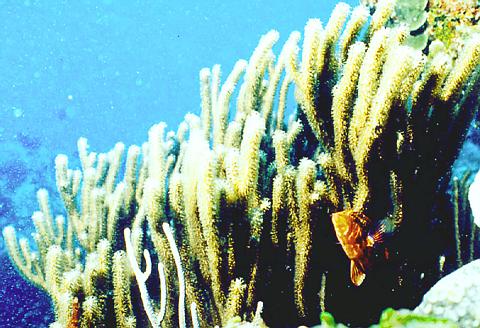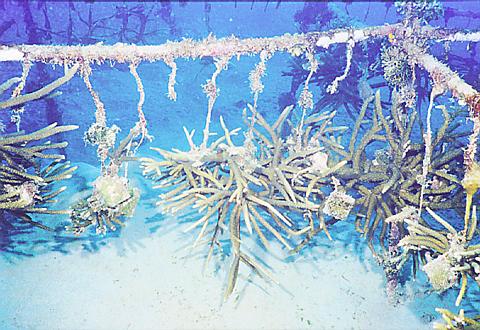Scientists studying coral reefs in Nanwan (
Such bleaching can be caused by disease or adverse changes in the environment around coral colonies, such as increased levels of UV radiation and excessive water temperatures.
At the time, the Third Nuclear Power Plant (

FILE PHOTO
The scientists, Fang Li-hsing (
The bleaching, they said, could be detected as far as 1.5km west of the pipes, and as deep as six meters below the surface, according to data collected by seven monitoring instruments deployed near the pipes.
At the time, coral bleaching was a newly-discovered phenomenon; work on its causes and effects has progressed steadily since.

FILE PHOTO
More than a decade later, Soong Ker-yea (宋克義), a professor of marine biology at the university, is continuing the tough tasks of both monitoring the site's ecological systems and attempting recovery work on the coral.
Current situation
Scientists and officials at the nuclear power facility are cautious when assigning blame to the problem.
"First of all, I should stress that damage to coral reefs in Taiwan's waters can be attributed to both natural and man-made factors," Soong said at a recent press conference held by officials at the nuclear power plant.
He explained that several problems, including over-fishing, water pollution, poaching of both coral and marine animals in addition to the construction of a causeway nearby had acted together to destroy some of the coral.
Composed of the calcified exoskeletons of colonies of marine polyps, coral reefs are among the richest, most productive ecosystems on the planet.
"Coral reefs, which are home to at least 35,000 marine species, exist in only 3 percent of the world's waters," Soong said, adding that Taiwan itself was surrounded by coral reefs.
Soong has begun a coral reef recovery program with assistance from Taipower. It involves work both in the field and in laboratories equipped to observe the properties of growing coral.
Showing reporters photographs taken in waters nearby, Soong said that the program would be able to propose measures to prevent more such environmental catastrophes, and find remedies to halt the deterioration of affected coral reefs.
Soong said that coral bleaching is a growing problem around the globe, and that up to70 percent of existing coral could actually disappear within 40 years, based on data from the US National Oceanic and Atmospheric Administration (NOAA), which has been engaged in global coral reef monitoring work for several years.
"We realize that coral reefs are being destroyed at an alarming rate, but it's hard for us to know precisely where and how much coral bleaching is happening, because of difficulties monitoring conditions underwater," Soong said.
Soong said that several foreign studies have strongly implicated gradual warming of the world's oceans as a major cause of coral reef bleaching.
"Coral is protected from UV light by chlorophyl-containing algae in a symbiotic relationship. But the algae is sensitive to elevated water temperatures, which hinder the process of photosynthesis in the organisms," Soong said.
Less algae means more damaging UV light can reach the coral, resulting in the death of coral colonies.
Hot water from nuclear power plants, he added, has been identified as the main reason for coral bleaching in areas near the Nanwan facility since the phenomenon was brought to light for the first time in Taiwan 11 years ago.
Sharing the blame
Aside from concerns over potential radiation leaks, nuclear power plants are still being targeted by environmentalists for their adverse effects on coral reefs.
In 1987, authorities at the Third Nuclear Power Plant, working together with academics, initiated a comprehensive monitoring and restoration project in coastal areas in southern Taiwan,
"The heat damage to coral reefs and the impact on marine ecology caused by hot water from the plant by itself is limited.
"We have taken action to control variations in the temperature of the water around affected reefs to within 4℃, which is bearable for coral," said Tu Yueh-yuan (杜悅元), director of Taipower's environmental protection department (台電環保處).
"In addition, we are working with the Tungkang Fisheries Research Institute (
"We have been very careful about [coral bleaching]. It's not reasonable to ask for the removal of the power plant just for the sake of the coral," said Tu, adding that the site was chosen for construction of the nuclear plant 15 years ago, before plans were made for Kenting National Park (
Taipower officials added that other factors also blamed for the coral bleaching should be investigated.
Officials said that due to the now-booming sightseeing business in Kenting -- which draws more than 3 million tourists every year -- increased sewage discharge in the area has polluted the waters, causing additional damage to nearby coral.
They added that proper environmental protection should be carried out by collaboration among different governmental administrative units.
A good example, they said, was a recently-completed sewage treatment network in the Nanwan area.
Construction of the sewerage system cost NT$610 million and has been in operation since last January. It can treat 3,000 tonnes of sewage daily, they said.
"Everyone should play their part in protecting our treasured environment," said Chen Pu-tsan (

The CIA has a message for Chinese government officials worried about their place in Chinese President Xi Jinping’s (習近平) government: Come work with us. The agency released two Mandarin-language videos on social media on Thursday inviting disgruntled officials to contact the CIA. The recruitment videos posted on YouTube and X racked up more than 5 million views combined in their first day. The outreach comes as CIA Director John Ratcliffe has vowed to boost the agency’s use of intelligence from human sources and its focus on China, which has recently targeted US officials with its own espionage operations. The videos are “aimed at

STEADFAST FRIEND: The bills encourage increased Taiwan-US engagement and address China’s distortion of UN Resolution 2758 to isolate Taiwan internationally The Presidential Office yesterday thanked the US House of Representatives for unanimously passing two Taiwan-related bills highlighting its solid support for Taiwan’s democracy and global participation, and for deepening bilateral relations. One of the bills, the Taiwan Assurance Implementation Act, requires the US Department of State to periodically review its guidelines for engagement with Taiwan, and report to the US Congress on the guidelines and plans to lift self-imposed limitations on US-Taiwan engagement. The other bill is the Taiwan International Solidarity Act, which clarifies that UN Resolution 2758 does not address the issue of the representation of Taiwan or its people in

US Indo-Pacific Commander Admiral Samuel Paparo on Friday expressed concern over the rate at which China is diversifying its military exercises, the Financial Times (FT) reported on Saturday. “The rates of change on the depth and breadth of their exercises is the one non-linear effect that I’ve seen in the last year that wakes me up at night or keeps me up at night,” Paparo was quoted by FT as saying while attending the annual Sedona Forum at the McCain Institute in Arizona. Paparo also expressed concern over the speed with which China was expanding its military. While the US

SHIFT: Taiwan’s better-than-expected first-quarter GDP and signs of weakness in the US have driven global capital back to emerging markets, the central bank head said The central bank yesterday blamed market speculation for the steep rise in the local currency, and urged exporters and financial institutions to stay calm and stop panic sell-offs to avoid hurting their own profitability. The nation’s top monetary policymaker said that it would step in, if necessary, to maintain order and stability in the foreign exchange market. The remarks came as the NT dollar yesterday closed up NT$0.919 to NT$30.145 against the US dollar in Taipei trading, after rising as high as NT$29.59 in intraday trading. The local currency has surged 5.85 percent against the greenback over the past two sessions, central